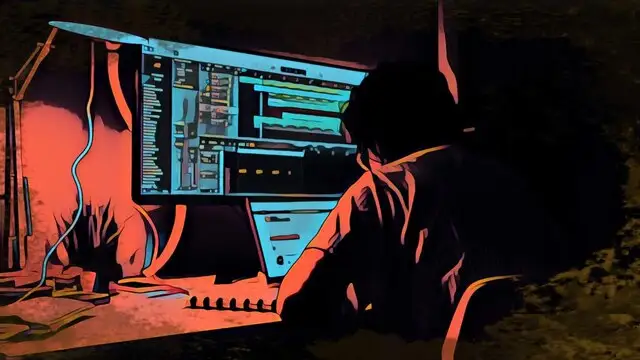I’m not claiming to be an expert at producing music for film and TV. But I have learned quite a bit — and I want to pass it along to you.
I’ve heard lots of advice from plenty of people who know more about this topic than I do, and I’ve put together the stuff that has stuck with me. Tips I’ve been using in my own productions.
So here’s what I know about how to create music for visual media.
What You Need
You might think you need to rent out a recording studio to get songs good enough for film and TV. Not true. You can make music in your bedroom and still get it placed in a show, commercial, or movie.
You just need some basic recording equipment, a quiet space, a drive to succeed, and a little knowledge about how to get started.
How To Start

“A creative rhythm can pull the listener in — they can literally feel the beat in their body.”
If you’re looking to make music for TV and film, it can be really tough to know where to start. I know firsthand. So I’m going to pass along tips other people have given me.
Intentionally Listen
The first step is to pay attention to what kind of music is in commercials, TV shows, and movies. Wherever your want your music, listen to the music that’s already there. Instead of watching TV, listen to it. Don’t skip that YouTube ad, listen to what music they use.
There are two websites that can help you find the exact songs in TV shows, commercials, movies, and video games: iSpot and tunefind .
Just find the show or type of ad you’d like to hear your music in, look it up online, and see what kind of music they’re already using. Then go and make that music. It’s that simple.
For example, I’ve recently been pursuing making music for indie filmmakers. So I watch short films and promotional videos made by indie filmmakers and super talented cinematographers, paying close attention to the songs in these videos.
Fortunately, the music they often use overlaps with the music I like to make.
Decide What Genre(s) You’ll Be Working In
The reason I decided to make music tailored toward indie filmmakers is because the music they often use is the music I already love to make.
Do this for yourself too. Find what type of visual media is using music similar to yours, then make more of that kind of music.
Let’s say you notice car commercials often use music that you make. Use iSpot or tunefind to see what a certain song is from one of those commercials, then use that song as your outline.
Let me be clear: I’m not at all suggesting you plagiarize.
I’m saying use a similar structure and similar elements in your song as the song in the commercial.
How does the song begin? When does it build and when does it decrescendo? What kind of instruments does it involve? What’s the mood and energy of the song? How does it end?
Use these things to direct your production, but come up with your own song. This way, there’s a better chance your song could get picked up for a car commercial.
Contact Other Musicians
This may feel like a shot in the dark, but when you find an artist who makes music for film and TV that resonates with you, email them. What’s it gonna hurt? The worst that could happen is they don’t respond.
But, honestly, most indie musicians are pretty cool and happy to share what they know.
When you email them, start with a compliment, quickly introduce yourself, and ask a specific question. Don’t go on and on about your life story. I understand it’s probably book-worthy, but no one has time for that kind of email.
Here are some good questions to ask (maybe just pick one for your email):
- I’m just getting into making music for film/TV — what’s your best advice?
- What sync licensing library(ies) have you had the most success with?
- How do you find jobs making custom music?
Producing Your Songs
Now that you’ve decided on your genre for your chosen niche of sync licensing, it’s time to create your song. The first thing I’d suggest is using a reference track.
Use A Reference Track
When you find a track (using iSpot or tunefind), download it, and drop it into your DAW. That’s your reference track. Now you have quick access to the song that is your “outline,” your inspiration. When you need to know where to go next in your production, unmute/solo the reference track.
Recording Your Song
Now that you know what elements to include, it time to start tracking them. And if you don’t have the instrument you need, there are plenty of very good plugins that can emulate the sounds you need. You can even use public domain samples to build your track, although that’s a little more difficult because you have less control over the chord progression or melody.
If you’re just starting out, it may work best to play all the parts yourself. This saves you loads of overhead costs. Because you don’t know if this song will definitely get placed in a show or commercial, it’s best to keep things as low-cost as possible.
Mix Your Track
This is a very important step in the music production of any song. In my opinion, it’s part of the artistic and creative process.
Again, you may want to learn how to mix instead of relying on a mixing engineer, especially if you plan on doing this in the long-run. Paying for someone to mix every single song of yours can add up.
If you’d like to get started mixing, check out our beginner’s guide right here .
Master Your Track
After mixing comes mastering, which is one of the most important aspects of producing music. And if you want to keep costs low, you can master an unlimited number of songs through eMastered for a low monthly cost.
Using the car commercial example from before, I can almost guarantee any big-name car commercial song has been professionally mastered.
Now, some artists say you don’t always need to master your tracks, which may be true for lower-budget projects if the song is background music. But if you want to land the big placements or those that prominently feature your song, it needs to be mastered.
If the sound quality is not up to industry standards, it won’t work in any show or ad that’s worth submitting to.
Where To Submit Your Music

There are so many sync licensing libraries and it seems there’s a new one every day. I’ve had some experience with a few libraries and I’ve become familiar with others as an outsider.
Here’s what I know about some libraries that I think are worth submitting your music to. Knowing more about each can help guide you on how to produce your music.
Musicbed
Musicbed is possibly the biggest licensing library geared toward professional filmmakers. They’re selective and seek to curate their library to fit their client’s needs, so if you can get in, that’ll be a great boost for your career.
Some Musicbed artists you may have heard of include Ben Rector, Benjamin James, and Judah & The Lion. Not superstars, but they’re making some decent money from their music.
Marmoset
Marmoset is similar to Musicbed in that they tailor their song selections to what filmmakers need, as opposed to YouTubers or podcasters. However, Marmoset is not as trafficked or well-known.
But they, too, are selective about what artists they partner with. So getting your music into Marmoset is a privilege.
Crucial Music
Crucial Music is not as selective as the previous two, but they don’t just let everyone in — they take less than 10% of the submissions they receive. They seem to prefer more energetic music over the mellow, ambient music you often see in Musicbed or Marmoset.
And one thing that makes them a little different is that you can’t just license a song on the spot — you need to contact their team. This ensures clients get exactly what they need and your song is used where it fits.
Pond5
Pond5 is a royalty-free stock video footage, pictures, and a bunch of other aural and visual media — including music. Because they offer content to so many different types of clients, they get the most traffic out of all these websites.
There is a selection process, but it’s not as strict as the others previously mentioned. Typically, they’re looking for typical stock music you’d hear in a YouTube video, a low-budget ad, or a corporate training video.
Also, everything is anonymous, meaning they don’t tell you where your songs end up or who licensed them.
Songtradr
Songtradr has no selection process — you upload your music and it’s automatically in their library. The downside to this is that there are a ridiculous amount of songs, making it more difficult for potential clients to find you. However, they do have featured playlists you can submit your music to (by using your credits, which you have to buy).
Songtradr can be a good option if you want a middleman to do the admin work and legal contracts. So let’s say a filmmaker comes to you and says they want to license one of your songs — you can send them the like to that song on Songtradr and have them license it that way.





